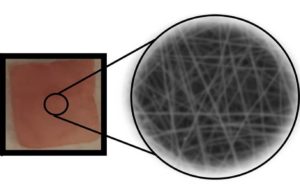
The researchers developed the membrane made from threads of a polymer commonly used in vascular sutures, according to the university’s website. The membrane can be loaded with therapeutic drugs and implanted in the body before mechanical forces activate its electric potential, slowly releasing the drugs. The researchers published information on the system in ACS Applied Bio Materials.
Led by UC Riverside associate professor of bioengineering, Jim Nam, the researchers found that poly(vinylidene fluoride-trifluro-ethylene), or P(VDF-TrFE) — which can produce an electrical charge under mechanical stress (a property known as piezoelectricity) — has the potential for use as a drug delivery vehicle.
Using electrospinning to produce nanofibers of the polymer that are layered in a thin mat and have optimized sensitivity so that the drug delivery system responds to physiologically safe magnitudes of force but are not triggered by daily activities. The film is embedded in a hydrogel designed to mimic living tissue. At the same time, the researchers maintain the ability to adjust the quantity of the drug being released by varying the applied pressure and duration.
“This piezoelectric nanofiber-based drug delivery system enables localized delivery of drug molecules on demand, which would be useful for diseases or conditions that require long-term, repeated drug administration, such as cancer treatments,” Nam said, according to UC Riverside’s website. “The large surface area-to-volume ratio of nanofibrous structure enables a greater drug loading, leading to a single injection or implantation that lasts longer than conventional drug delivery.”

